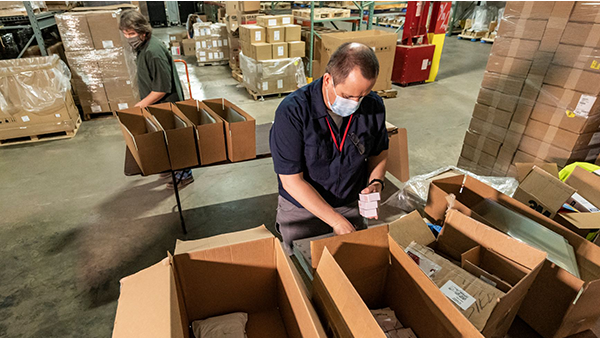While much has changed in our world since the start of the pandemic, there are some positive developments and plenty of lessons learned that will help us as we move toward the future. Certainly, lessons were learned in the world of laboratory safety. Here at the Wisconsin State Lab of Hygiene, which is home to WSLH Proficiency Testing, we are constantly learning about adaptation during the COVID-19 pandemic from our colleagues and coworkers at the Wisconsin Occupational Health Laboratory Division. In particular, their free consultation program WisCon has expanded their services from assisting small businesses with chemical, noise, and air monitoring, to now providing COVID-19 consultations and respirator fit test kits to facilities, including skilled nursing facilities. As North American Occupational Safety and Health Week (May 2-8) approaches, WSLH Proficiency Testing (PT) wants to raise awareness of the importance of preventing injuries and illnesses at work. Regardless of our sector or industry of employment, WSLH PT hopes that individuals and organizations take advantage of the resources that maybe available to them to ensure a safe and healthy work environment.

Ernie Stracener from the Wisconsin State Lab of Hygiene gets to see how everything is made, from foundries pouring molten steel to veterinarian clinics conducting testing for your pets. It’s a wonderful side-perk in his efforts to help small businesses maintain safe working conditions. Ernie Stracener is the Consultation Program Manager for the Wisconsin State Laboratory of Hygiene’s WisCon project, which provides free industrial hygiene inspections and occupational safety consultations for small businesses across the state of Wisconsin.
The WisCon project is the largest consultation agency in the state of Wisconsin, helping the private sector have on-site and virtual consultations regarding any potential work-related hazards, including noise level testing, gas monitoring and air quality sampling.
Every week, consultants from WisCon travel the state conducting on-site inspections and providing safety consultations to small businesses with under 250 employees. That adds up to a little over 450 on-site consultations with approximately 350 businesses every year. The WisCon project has been in existence for 40 plus years, and has had to get creative like so many others in response to COVID-19 in how they provide their services.
Since the pandemic, WisCon has been providing consultations on COVID-related activities. Starting in July of last year, the Wisconsin State Lab of Hygiene partnered with the Wisconsin Department of Health Service (WDHS) to expand lab capacity in SARS-CoV-2 testing for the state. As part of that partnership, WisCon received funding to provide COVID-19 consulting, create and distribute respiratory fit tests for N-95 masks and other respirators, and develop decontamination methods for single-use PPE for small businesses and medical facilities. Such services that WisCon provides, Ernie adds, are very unique to the state of Wisconsin. “It may be happening from other sources, but this is a product of a very specific request from the Wisconsin Department of Health Services. We were glad we could be plugged into the COVID relief efforts in this way. It’s been rewarding,” said Stacener.
As WisCon continues to provide and expand occupational health and safety services to small businesses and facilities in the private sector within Wisconsin, there are other sectors that could benefit from WisCon’s free consultations, including the public sector. However, public sector employees in Wisconsin right now can take advantage of COVID-related consultations from WisCon. Many more opportunities to expand service in workplace safety and industrial hygiene in all sectors of employment may arise as individuals become aware of the vital resource that WisCon provides. Raising awareness as part of North American Occupational Safety and Health Week presents an excellent opportunity to focus, reinforce, and strengthen commitment to occupational safety and health. For clinical laboratories in particular, WSLH Proficiency Testing encourages you to visit OSHA’s Laboratories page promoting a culture of safety and implementing standards and practices.


